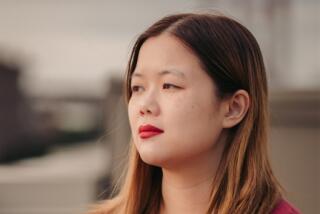Book Review : Tortured Woman in a Sadistic Marriage
- Share via
The Butcher’s Wife by Li Ang. Translated by Howard Goldblatt and Ellen Yeung (Northpoint: $14.95)
“I cannot deny,” Li Ang writes in her introduction to this grisly novel, “that I approached the writing of ‘The Butcher’s Wife’ with a number of feminist ideals, wanting to show the tragic fate that awaited the economically dependent Taiwanese woman living under the rules of traditional Chinese society. But as I wrote, I found myself becoming more and more concerned with larger issues of humanity, such as hunger, death, sex. What I want to emphasize here is that the ultimate concern of a piece of ‘feminist literature’ is, after all, human nature.”
“The Butcher’s Wife” may be, in spite of its diminutive size, its relatively obscure place of origin, and the fact that it springs from a society still strictly and stubbornly patriarchal, the very meanest, most frightening book ever written about women oppressed by men, or any helpless victim snuffed out by an uncaring society.
This novel is based on a murder that occurred in Shanghai in the 1930s. A young wife murdered her husband--not entirely unheard of in any society--but the standard beliefs of the time dictated that no woman would do such a thing unless she was “promiscuous,” unless she had a lover. The wife stoutly denied any such thing. She insisted that she had murdered her husband on the basis of his abuses alone.
Years later, Li Ang, the author, realizing she knew nothing of urban Shanghai, daringly moved the story to her own home, “a small seacoast town in central Taiwan . . . and so the basic elements of a sensational murder case that had actually occurred in Shanghai were transported to Taiwan and transformed into a story of old Taiwanese society.”
But take another look! Didn’t Farrah Fawcett make her break-out movie about a woman who takes so much abuse from her husband that she retaliates in the only way she can--by incinerating her spouse as he sleeps? The configurations of this story are universal: They take as their subject a social contract that has been breached, the idea of a marriage as some kind of sanctuary turned instead into a prison inhabited by torturer and tortured.
The terrible thing, of course, is that one man cannot torture one woman unless the rest of their world looks on and condones that atrocity. (In political terms, for instance, the world looks on as white South Africa abuses black South Africa, as Russia has its way with Afghanistan, as America acts out its weird fantasies in Central America.) Boys will be boys! And only once in a thousand or a million times do the powerless get it together enough to turn on those who make their lives unbearable.
If I’ve been putting off telling the plot of “The Butcher’s Wife,” it’s because what Li Ang has to say is so bitter, so insulting to most of the human race (not just men) that I almost don’t want to repeat it. The simple story is this. Lin Shi is an only daughter whose father dies. In a society where women have no worth, Lin and her mother are turned out on the streets of the village by her father’s family. Lin Shi’s mother, starving, sells herself to a soldier for two rice balls and is either killed or run out of town.
Poor Lin Shi is then traded in marriage to a pig butcher, so that her father’s family will never run out of pork. This husband, Chen Jiang Shui, is greasy, hideous and a confirmed sadist. His idea of a perfect day is to spend his mornings in the slaughterhouse stabbing screaming pigs, then come home, eat a heavy meal, and rape his wife with such brutality that she shrieks repeatedly in pain.
As long as Lin Shi has at least some food and a roof over her head, she’s not unbearably unhappy. But at the heart of the story is another truly demonic character, Auntie Ah-Wang, an elderly woman of the village, who, if she were a good sort or if this were another kind of story, would function as surrogate parent to the unfortunate young wife.
As it is, Ah-Wang stands outside their window and watches as Chen tortures Lin Shi, then reports to the rest of the village that Lin Shi is a slut, just like her mother, and is keeping the rest of the village awake at night with shrill cries of sexual delight.
When Lin Shi overhears this gossip, she is so mortified that she refuses to scream; the unregenerate, bestial Chen steps up the torture, Lin Shi loses her mind and kills her husband, disemboweling him just as he has ripped open so many terrified pigs.
Some of these ideas have floated about in several societies for centuries. The old fairy tale, “Beauty and the Beast,” is a benign variation on this theme. The careless throw-away line some of our mothers used to recite: “All men are beasts,” is another. Certainly sex, economics and food are always linked. (In many ways these links aren’t carefully thought out here; Li Ang has gone for the sensational details rather than any deep thoughts.) Certainly, though, the author is evenhanded in dealing out blame. Men who abuse are no more at fault than women who stand by and let it happen.
More to Read
Sign up for our Book Club newsletter
Get the latest news, events and more from the Los Angeles Times Book Club, and help us get L.A. reading and talking.
You may occasionally receive promotional content from the Los Angeles Times.








